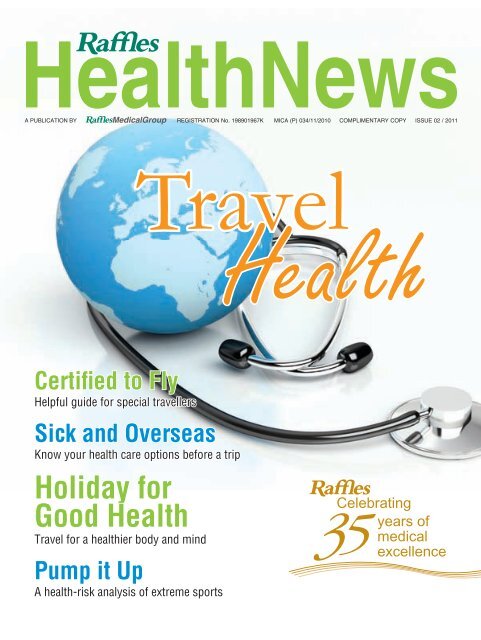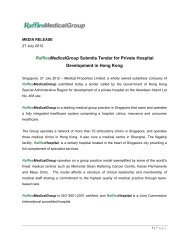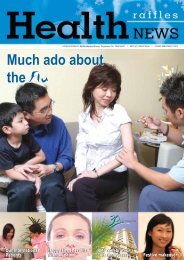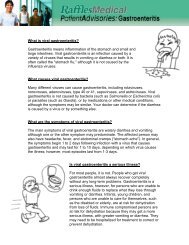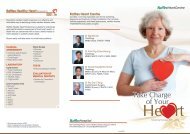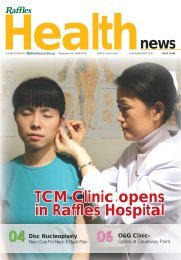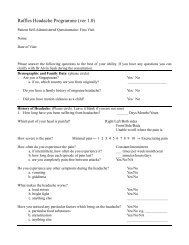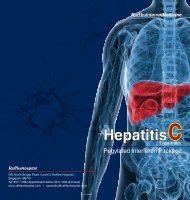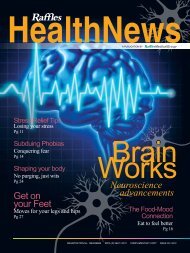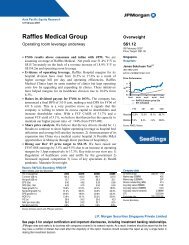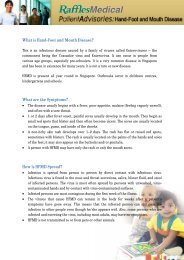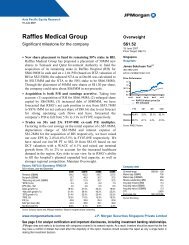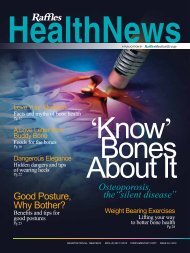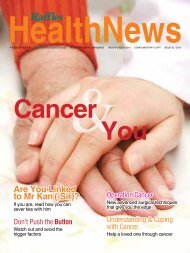REGISTRATION No. 198901967K MICA (P) - Raffles Medical Group
REGISTRATION No. 198901967K MICA (P) - Raffles Medical Group
REGISTRATION No. 198901967K MICA (P) - Raffles Medical Group
You also want an ePaper? Increase the reach of your titles
YUMPU automatically turns print PDFs into web optimized ePapers that Google loves.
A PUBLICATION BY <strong>REGISTRATION</strong> <strong>No</strong>. <strong>198901967K</strong> <strong>MICA</strong> (P) 034/11/2010 COMPLIMENTARY COPY ISSUE 02 / 2011<br />
Travel<br />
Health<br />
Certified to Fly<br />
Helpful guide for special travellers<br />
Sick and Overseas<br />
Know your health care options before a trip<br />
Holiday for<br />
Good Health<br />
Travel for a healthier body and mind<br />
Pump it Up<br />
A health-risk analysis of extreme sports<br />
Celebrating<br />
years of<br />
medical<br />
excellence
Are you travelling<br />
Put your mind<br />
at ease<br />
during your travel and<br />
vaccinate against:<br />
1<br />
2<br />
3<br />
Flu vaccination @ $23.40<br />
Cholera-Traveller’s Diarrhoea @ $150<br />
(for 2 doses)<br />
Hepatitis A & B vaccinations @ $265.50<br />
(package of 3 doses)<br />
Terms and conditions:<br />
1. All credit card promotions are not valid with the above packages.<br />
2. Please check with clinics on the availability of the above items.<br />
3. Valid from 1 April 2011 to 31 May 2011.<br />
4. All prices are inclusive of GST.<br />
5. Only valid at <strong>Raffles</strong><strong>Medical</strong> Panel of Clinics in Singapore. Packages are not available at <strong>Raffles</strong> Health Screeners and <strong>Raffles</strong> Executive <strong>Medical</strong> Center.<br />
Enquire at any <strong>Raffles</strong> <strong>Medical</strong> Clinic today!<br />
Also available: Travel Kit @ $26.95<br />
(Includes medicines to treat fever, pain, diarrhoea,<br />
gastritis, runny nose and itch)<br />
Health Supplements<br />
<strong>Raffles</strong> Cardio Omega 3 1200mg (40s) @ $23.25<br />
<strong>Raffles</strong> Glucosamine 1500mg (40s) @ $33.35<br />
<strong>Raffles</strong> Adult Multi (60s) @ $25.00<br />
For general enquiries, please call 6311 2222 and emergencies at 6311 1555<br />
or any <strong>Raffles</strong> <strong>Medical</strong> panel of clinics.<br />
Visit us at www.rafflesmedical.com
Contents<br />
Supplements 27<br />
NewsRoom 4<br />
New Doc on the Block | Survey | RMG 35th Anniversary<br />
Charity Drive | Purchase Of Property At Orchard Road<br />
Food<strong>No</strong>tes 28<br />
Ask a <strong>Raffles</strong> Doc 29<br />
Features<br />
Promotions 30<br />
Jab to Travel 6<br />
Learn how to protect yourself by getting vaccinated before<br />
travelling. Learn how vaccinations and precautions can help<br />
to combat travelling viruses.<br />
Travelling With Kids:<br />
As Easy As ABC 8<br />
How can you enjoy travelling with your kids Learn little tips and<br />
tricks from our experts to make your next holiday a breeze.<br />
Sick and Overseas 11<br />
How to avoid falling sick while overseas Here are some health<br />
care options for you.<br />
Certified to Fly 15<br />
Read on for some helpful guides that serve to make your<br />
travelling experience a more delightful one.<br />
UpClose 18<br />
Ms Loke Mei Choo, Deputy Director of <strong>Raffles</strong> <strong>Medical</strong>, shares with<br />
Upclose about her challenging, yet interesting, job and tips to enjoy<br />
work.<br />
Holiday for Good Health 20<br />
The expert shares some of the top reasons why we should go ahead<br />
and book our tickets for a holiday.<br />
Beat the Travellers’ Woes 22<br />
You won’t want to be feeling under the<br />
weather during your holiday. Here are<br />
some tips to avoid the common<br />
ailments that affect travellers.<br />
Pump it Up - Extreme Sports<br />
Dissected 24<br />
Thinking of engaging in an extreme sport Let the experts share the<br />
pros and cons with you.<br />
DIRECTORY<br />
www.rafflesmedicalgroup.com<br />
Corporate Accounts Enquiries 6311 1333<br />
Fax <strong>No</strong>. 6311 2383<br />
www.rafflesmedical.com<br />
General Enquiries 6311 2222<br />
Fax <strong>No</strong>. 6311 2392<br />
• Anchorpoint 6479 3818<br />
• Ang Mo Kio 6453 2288<br />
• Anson Centre 6225 2188<br />
• Bedok <strong>No</strong>rth 6441 1736<br />
• Bishan 6456 7122<br />
• Capital Tower 6323 5212<br />
• Causeway Point 6894 0777<br />
• Centrepoint 6733 8775<br />
• Changi Business Park 6781 7337<br />
• Clementi 6872 9043<br />
• Compass Point 6881 7337<br />
• Fusionopolis 6466 7366<br />
• Harbour Front 6273 3078<br />
• Hougang Central 6386 7896<br />
• Jurong East 6899 6688<br />
• Lot 1 6765 3363<br />
• Loyang Point 6585 3333<br />
• Mapletree Business City 6570 6970<br />
• Marina Square 6339 6644<br />
• Millenia Walk 6337 6000<br />
• Ngee Ann City 6734 7355<br />
• Nex 6634 2585<br />
• <strong>No</strong>rthpoint 6755 0049<br />
• One Marina Boulevard 6225 2776<br />
• One <strong>Raffles</strong> Place* 6535 2222<br />
• <strong>Raffles</strong> Airport <strong>Medical</strong> Centre<br />
Passsenger Terminal Two* 6543 1118<br />
Passsenger Terminal Three* 6241 8818<br />
Airport Transit One 6543 1113<br />
Airport Transit Two 6543 1118<br />
Airport Transit Three 6241 8333<br />
Changi Cargo Complex 6543 1038<br />
• <strong>Raffles</strong> City 6339 6911<br />
• <strong>Raffles</strong> Hospital 6311 2233<br />
• Robinson Point 6223 1188<br />
• Science Park I 6776 7155<br />
• Sembawang Way 6853 7703<br />
• Siglap Centre 6442 0488<br />
• Sixth Avenue 6462 3426<br />
• Tampines 1* 6260 5116<br />
• Tampines Junction 6788 2222<br />
• TechPlace II 6556 2318<br />
• Toa Payoh Central 6254 7667<br />
* Clinics with X-ray facilities<br />
Hong Kong Clinics (852) 2525 1730<br />
Shanghai <strong>Medical</strong> Centre (86) 21 6197 2300<br />
www.raffleshospital.com<br />
General Enquiries 6311 1111<br />
Call Centre Fax <strong>No</strong>. 6311 2136<br />
24 Hour Emergency 6311 1555<br />
Admissions / Business Office 6311 1888<br />
<strong>Raffles</strong> International Patients Centre 6311 1666<br />
International Patients Centre Fax <strong>No</strong>. 6311 2333<br />
24 Hour Appointments Hotline 6311 1222<br />
Fax <strong>No</strong>. 6311 2136<br />
Email<br />
specialist@raffleshospital.com<br />
<strong>Raffles</strong> Aesthetics<br />
<strong>Raffles</strong> Cancer Centre<br />
<strong>Raffles</strong> Children’s Centre<br />
<strong>Raffles</strong> Chinese Medicine<br />
<strong>Raffles</strong> Counselling Centre<br />
<strong>Raffles</strong> Dental<br />
<strong>Raffles</strong> Dialysis Centre<br />
<strong>Raffles</strong> ENT Centre<br />
<strong>Raffles</strong> Executive <strong>Medical</strong> Centre<br />
<strong>Raffles</strong> Eye Centre<br />
<strong>Raffles</strong> Fertility Centre<br />
<strong>Raffles</strong> HealthScreeners<br />
<strong>Raffles</strong> Heart Centre<br />
<strong>Raffles</strong> Internal Medicine Centre<br />
<strong>Raffles</strong> Japanese Clinic<br />
<strong>Raffles</strong> Orthopaedic Centre<br />
<strong>Raffles</strong> Pain Management Centre<br />
<strong>Raffles</strong> Skin Centre<br />
<strong>Raffles</strong> Surgery Centre<br />
<strong>Raffles</strong> UroRenal Centre<br />
<strong>Raffles</strong> Women’s Centre<br />
Physiotherapy Centre<br />
Radiology<br />
Regional Representative /<br />
Liaison Centres Offices<br />
Indonesia<br />
Jakarta Representative Office 62 21 5785 3979<br />
Semarang Representative Office 62 24 841 9600<br />
Yogyakarta Representative Office 62 274 623288<br />
Solo 62 271 3020033<br />
Editorial: Dr Prem Kumar Nair, Magdalene Lee,<br />
Clara Cai, Joanna Lee & Fann Khoo<br />
Creative: Edd Chua & Jenny Cheok<br />
The information contained in this publication should<br />
not be regarded as a substitute for detailed medical<br />
advice in individual cases.<br />
All rights reserved. <strong>No</strong> part of this publication may<br />
be reproduced in any form or by any means without<br />
the written permission of the publisher.<br />
Please address all correspondence to<br />
The Editor, <strong>Raffles</strong> HealthNews,<br />
Fax no. 6311 2378<br />
Email: healthnews@rafflesmedical.com<br />
<strong>Raffles</strong> HealthNews is published by<br />
<strong>Raffles</strong> <strong>Medical</strong> <strong>Group</strong> Ltd<br />
585 <strong>No</strong>rth Bridge Road, <strong>Raffles</strong> Hospital<br />
#11-00, Singapore 188770<br />
www.rafflesmedicalgroup.com<br />
Printed by Xpoprint (Asia) Pte Ltd<br />
May 11
Newsroom <strong>Raffles</strong> HealthNews<br />
1 New Docs on the Block<br />
Physician Liu Qiao De graduated from Singapore College of Traditional Chinese Medicine in 1977 and has<br />
been practising Traditional Chinese Medicine since then. In the early 90’s, he pioneered a ‘Quit Smoking’<br />
programme using auricular acupuncture.<br />
He has special interests using acupuncture and herbal medicine to treat respiratory conditions such as coughs<br />
and colds, digestive disorders such as gastritis, skin problems such as eczema and psioriasis, and diabetes.<br />
He also specialises in treating children with asthmatic conditions.<br />
Dr Felicia Tan, Specialist in General Surgery, received her post-graduate training as a general surgeon and<br />
sub-specialised in breast surgery. She obtained a Masters of Medicine (Surgery)(Singapore) in 2005 and<br />
became a fellow of the Royal College of Surgeons (Edinburgh).<br />
Dr Tan’s clinical interest lies in breast oncology and the use of surgical techniques to achieve the best oncologic<br />
and cosmetic outcome for her patients. This includes breast conservation surgery for cancers as well as<br />
nipple-sparing and skin-sparing mastectomies with immediate breast reconstruction. She is also adept with the<br />
whole range of breast surgical procedures. Dr Tan is the pioneer of the procedure radioisotope occult lesion<br />
localisation (ROLL) in Singapore and she continues to perform the full range of general surgical operations.<br />
Her current research interests lies in breast oncology. She received the Singapore Millennium Foundation<br />
Scholarship in 2007 to pursue her research interests. Dr Tan actively promotes breast cancer awareness both<br />
locally and internationally.<br />
2<br />
Dental Implants:<br />
A permanent solution to tooth loss<br />
Losing your teeth may make you too self conscious to smile or talk.<br />
Tooth loss can result in shifting of the remaining teeth leading to bite<br />
problems which in turn may affect your ability to eat and speak clearly.<br />
In extreme cases, it can also make one look older or experience chronic<br />
jaw pain.<br />
An increasingly popular and proven way to resolve the problem<br />
of missing teeth is dental implants. Dental implants are artificial<br />
tooth replacements surgically anchored into the jawbone to hold a<br />
replacement crown, bridge or overdenture in place.<br />
The main benefit is that dental implants are stable, long term and they<br />
look and feel like natural teeth. If properly cared for, dental implants can<br />
last a lifetime, making them more cost-effective than crowns or bridges<br />
which may need replacements every 7 to 15 years.<br />
“Dental implant replaces not just the crown but also the missing tooth<br />
root,” explains Dr Wong Wai Yee, Specialist in Oral Maxillofacial<br />
Surgery, <strong>Raffles</strong> Specialist Dental Centre, “This gives your teeth<br />
strength and durability to eat all the food you enjoy.”<br />
Adrian Yap, Specialist<br />
in Prosthodontics and<br />
Dental Director of <strong>Raffles</strong><br />
Specialist Dental Centre.<br />
“Overall dental implants<br />
help to improve one’s<br />
self-esteem, oral health,<br />
comfort, speech, chewing<br />
and appearance.”<br />
Crown -<br />
artificial<br />
replacement tooth<br />
Implant -<br />
replaces tooth<br />
root<br />
The success rate for dental implant therapy depends on the purpose<br />
and its location. For implants located at the front of the lower jaw,<br />
success rate can be as high as 99%. The typical healing time for<br />
implants to restore is about 3 to 6 months.<br />
abutment<br />
(post extension)<br />
In <strong>Raffles</strong> Specialist Dental Centre, the surgery is performed by<br />
an oral surgeon, and the restoration is placed by a prosthodontist.<br />
The specialists work together to ensure patients have a fuss-free<br />
experience. Anxious patients may also opt to do their implant surgery<br />
under the additional comfort of sedation.<br />
“Apart from restoring full functionality of your teeth and its supporting<br />
structures, dental implants are also more tooth-saving than traditional<br />
bridgework, since implants do not require the cutting down of<br />
neighbouring teeth for support. It also prevents further bone loss and<br />
gum recession, thereby preserving facial contours as well,” adds A/Prof<br />
In selected cases, the dental implant can be placed at the same time<br />
as a tooth extraction to minimise the number of clinic visits. It helps<br />
to reduce the number of surgical procedures and trauma, easily<br />
shortening your healing and treatment time by a few months.
<strong>Raffles</strong> HealthNews Newsroom <br />
Purchase Of Property<br />
At Orchard Road<br />
For A Specialist <strong>Medical</strong> Centre<br />
3<br />
On 18 February 2011, the Board of Directors of <strong>Raffles</strong> <strong>Medical</strong> <strong>Group</strong> announced to the media its<br />
purchase of a seven-storey freehold podium/commercial block of Thong Sia Building, located at<br />
30 Bideford Road in Singapore at S$92.08 million. The strata floor area of the property is 42,668<br />
square feet.<br />
Thong Sia Building is a 26-storey commercial cum residential building located in the prime Orchard<br />
Road belt. The podium/commercial block currently consists of seven storeys of showrooms and<br />
offices.<br />
The <strong>Group</strong> intends to establish a Specialist <strong>Medical</strong> Centre at the property.<br />
When fully established, the Centre would have the following services<br />
and facilities: a 24-hour Emergency Care Centre, Health Screening<br />
Centre, Radiology and Imaging Centre, <strong>Medical</strong> Laboratory,<br />
Fertility Centre, Cancer Centre, Dental Centre and clinics for<br />
Obstetrics and Gynaecology, Paediatrics, Cardiology,<br />
General Surgery, Orthopaedic Surgery, Ophthalmology,<br />
ENT Surgery, Dermatology and <strong>Medical</strong> Aesthetics.<br />
<strong>Raffles</strong> <strong>Medical</strong> <strong>Group</strong><br />
35th Anniversary<br />
Charity Drive<br />
4<br />
<strong>Raffles</strong> <strong>Medical</strong> <strong>Group</strong> (RMG) celebrates its 35th anniversary<br />
this year with a series of activities. On April 8, a charity golf<br />
tournament was held at <strong>Raffles</strong> Country Club as golf enthusiasts<br />
from the healthcare industry, as well as corporate clients,<br />
gathered to give their best for a good cause.<br />
The event was organised to raise funds in aid of the elderly at<br />
St. Joseph’s Home, Alzheimer's Disease Association and Ling<br />
Kwang Home. Performance Motors Ltd sponsored a BMW<br />
5 Series car as the hole-in-one prize for the event. The day ended<br />
on a high note with sumptuous dinner, lucky draw prizes and<br />
announcement of the tournament champion.<br />
In addition to the funds raised during the charity golf, donation<br />
boxes are placed at the counters in <strong>Raffles</strong> <strong>Medical</strong> GP clinics<br />
and specialist centres in <strong>Raffles</strong> Hospital to encourage patients to<br />
join in the joy of giving to the elderly at these homes.<br />
5<br />
<strong>Raffles</strong> HealthNews<br />
Readership Survey<br />
We conducted the first-ever <strong>Raffles</strong> HealthNews survey<br />
from <strong>No</strong>vember 2010 to February 2011. The survey<br />
saw a good mix of respondents. Based on the survey,<br />
the regular HealthNews reader is above 40 years old,<br />
Singaporean, and a degree holder.<br />
We found that most of the respondents pick up the<br />
magazine in the Hospital and circulated it to at least two<br />
other persons. A growing number of readers are reading<br />
the magazine through online subscription.<br />
In general, respondents are very satisfied with the<br />
magazine and found the contents in the magazine useful.<br />
Positive comments on the content, design and quality<br />
printing were noted. Half of the respondents look forward<br />
to the magazine and are keen to participate in contests.<br />
Moving forth, we will include contests and cover<br />
popular topics such as health screenings, men’s<br />
health, aesthetics and skin care in the future issues of<br />
HealthNews. We thank all who have participated to help<br />
make <strong>Raffles</strong> HealthNews better.
Feature <strong>Raffles</strong> HealthNews<br />
Jab<br />
Travel<br />
to<br />
How Vaccination Works<br />
In a nutshell, vaccination provides you with the immunity to a<br />
particular disease before there is a chance of it making you<br />
sick. This is usually done by injecting a weakened or killed<br />
germ into the body.<br />
Essentially, vaccines give the body a preview of the germ and<br />
prepare it in advance to build fighting equipment (antibodies<br />
and white cells) in battling against it. After the vaccine has<br />
done its work, the body’s immune system will then be ready to<br />
defend itself against that particular pathogen when it invades<br />
the body.<br />
"There may be times when our immune systems may require<br />
a booster shot to 'remind' our bodies how to fight off a germ,<br />
but by and large, our bodies tend to 'remember' how to do it for<br />
the rest of our lives. Thus, antibodies do stay with us for a long<br />
time,” says Dr Rupert See, Senior Physician at <strong>Raffles</strong> <strong>Medical</strong>.<br />
How Viruses Travel<br />
As a general rule, an infection is acquired from other persons,<br />
animals, insects or fomites. It does not occur de novo.<br />
Sometimes, a germ may already be harbouring on the surface<br />
of your body but through another insult (a cut or an infection), it<br />
enters and cause an infection. One example is Streptococcus<br />
pneumoniae, a germ causing pneumonia. The chance of<br />
acquiring an infection is high when we touch our face, eyes,<br />
nose and mouth with unsterilised hands. The most common<br />
channels of infection are through faecal-oral and respiratory<br />
transmissions.<br />
Faecal-oral transmission often leads to vomiting or diarrhoea.<br />
Examples of such viral infections include Rotavirus,<br />
Enteroviruses, Salmonella (typhoid fever), Shigellosis and<br />
Hepatitis A.<br />
Believe it or not, different types of bacteria are constantly on<br />
our hands. The chances of us picking up faecal bacteria are<br />
high. This is because we are working with our hands most of<br />
the time, handling and coming into contact with different objects<br />
and people.<br />
Dr Leong Hoe Nam, Specialist in Infection Disease at <strong>Raffles</strong><br />
Internal Medicine Centre illustrates, “When commuting on<br />
a train or bus, we tend to grab hold of the poles to steady<br />
ourselves during the journey. We have absolutely no idea if the<br />
people before us, who had touched the same spot on the same<br />
pole, had clean hands or hands covered with faecal bacteria. If<br />
it’s the latter, we pick up the same and it stays with us until we<br />
sterilise our hands with soap and water or alcohol rubs.”<br />
Respiratory transmission is another common channel of viral<br />
infection. It is spread through droplets when one coughs or<br />
sneezes. Common types of viruses are influenza, tuberculosis<br />
and pertussis.<br />
“When one sneezes, millions of germ-containing droplets are<br />
released into the air, where they can travel as far as two meters<br />
before settling on objects, clothing or skin. Thus, this leads<br />
to the spreading of viruses from one person to another,” says<br />
Dr Leong.
<strong>Raffles</strong> HealthNews Feature <br />
Going on a vacation soon <strong>No</strong> matter which destination it is, one thing that<br />
tags closely along with you is your health. You probably have heard people<br />
talk about getting vaccinated before travelling, especially to Third World<br />
countries. Do you understand the importance of it and take necessary<br />
precautions while travelling, or do you think that chances of you acquiring<br />
a viral infection are much lower than anyone else<br />
How to Protect Yourself<br />
Consult your doctor four to six weeks before your trip about<br />
suitable vaccinations required and special health concerns of<br />
those places you will be visiting. As most vaccines require time<br />
to become effective, and some require more than one shot, this<br />
will also allow ample time for your body to develop full immunity<br />
from it.<br />
Depending on your health conditions and the country you are<br />
travelling to, the potential risk of diseases varies. Dr Leong<br />
recommends the following precautionary tips and the primary<br />
list of vaccinations that one should consider acquiring.<br />
Protect Yourself with Vaccinations<br />
Primary list of vaccinations against:<br />
• Influenza<br />
• Tetanus, Diptheria, acellular Pertussis (Tdap)<br />
Tetanus is a disease that infects the body through a deep<br />
wound. Diptheria primarily affects the lining of the mucous<br />
membrane of the throat and other respiratory passages,<br />
while Pertussis is also known as the “whooping cough”.<br />
• Hepatitis A<br />
Protect Yourself by Taking Precautions<br />
• Drink bottled water.<br />
• If in doubt, rinse your mouth only with bottled water.<br />
• Avoid uncooked food (e.g salads, shellfish).<br />
• Avoid eating food from roadside stalls.<br />
• Avoid going close to animals. Most of them contain ticks<br />
that may jump onto you.<br />
• Carry a first aid kit equipped with basic medication for<br />
fever, headaches, stomach upset and external wounds.<br />
• You can obtain useful information such as precautions<br />
and vaccinations to acquire, for travelling to a particular<br />
country at www.cdc.gov/travel.<br />
• If you are travelling to an area infested with mosquitoes,<br />
do consider malaria prophylaxis and the use of DEET<br />
(N,N-Diethyl-meta-toluamide) of at least 15%.<br />
The latter is a potent anti-mosquito agent proven to<br />
reduce mosquito bites. Mosquitoes may transmit different<br />
types of infection, notably Dengue Fever, Yellow Fever<br />
and Chikungunya in our region. HN
Feature <strong>Raffles</strong> HealthNews<br />
Travelling<br />
With Kids:<br />
As Easy As<br />
Having children does<br />
not mean you have<br />
to forgo travelling<br />
altogether. With<br />
proper planning and<br />
preparation, you can<br />
enjoy travelling as a<br />
family. Learn little tips<br />
and tricks from our<br />
experts to make your<br />
next holiday a breeze.
<strong>Raffles</strong> HealthNews Feature <br />
You may think that<br />
travelling with children<br />
is not something for<br />
the faint-hearted.<br />
Travelling with a little<br />
child may not be<br />
carefree; however, it<br />
can also be one of the<br />
most wonderful and<br />
remembered times of<br />
one’s life.<br />
Attitude<br />
When travelling, expect problems. After<br />
all, Murphy’s Law says that anything that<br />
can go wrong will go wrong. However,<br />
problems need not spoil your trip. If you<br />
look on each problem as an adventure,<br />
which you and your kids can overcome<br />
together, you will find it easier. So the<br />
flight is delayed, go bond with your child<br />
over a cup of hot chocolate. Caught in<br />
the snow Time for a snowball fight (just<br />
dress up in the correct gear)!<br />
Be cool<br />
Cool is not just a word for the young.<br />
When you are stressed, your child is<br />
going to feel it. So stay cool, relax.<br />
“When you are not jittery, you will be<br />
able to think better and react better<br />
to problems,” Mr Danny Ng, Clinical<br />
Psychologist at <strong>Raffles</strong> Counselling<br />
Centre, points out.<br />
Choose age-correct<br />
activities<br />
You may really want to try rock climbing<br />
or sky diving. But in consideration for your<br />
little one, give these activities a miss this<br />
time. Go for activities that would be fun<br />
for the entire family. For example, wildlife<br />
watching can be an enriching experience<br />
and a good way to bond.<br />
Distract<br />
There would be plenty of waiting time in<br />
between. Rather than watch your boy<br />
jump on his seat or have your daughter<br />
crawl all over the hotel lobby, Dr Clarice<br />
Hong, Specialist in Psychiatry at <strong>Raffles</strong><br />
Counselling Centre, recommends packing<br />
their favourite toys and dangling wrapped<br />
up little treats such as a new toy or a book<br />
for those difficult times.<br />
Emergencies<br />
Be prepared for emergencies. Pack a<br />
small emergency kit comprising a mini<br />
sewing kit, an all-purpose foldable tool<br />
(e.g. Swiss army knife), a conversion plug<br />
and small flashlights. Other good to haves<br />
that should make it into your luggage<br />
include wet wipes, detergent, travel<br />
umbrella, diapers in excess, and Ziploc<br />
bags of varying sizes.<br />
First aid<br />
You never know when your little one<br />
may fall ill and the last thing you want is<br />
to search in the middle of the night for<br />
a pharmacy which operates 24-hrs in a<br />
foreign land. Dr Veronica Toh, Specialist<br />
in Paediatrics and Neonatology at <strong>Raffles</strong><br />
Children’s Centre, advises parents<br />
to bring a small kit of travel medicine<br />
consisting of:<br />
•<br />
•<br />
•<br />
•<br />
•<br />
•<br />
•<br />
paracetamol<br />
antihistamine<br />
nose drop<br />
probiotic for diarrhoea<br />
anti-itch cream<br />
plasters<br />
thermometer<br />
Gear up<br />
It never hurts to bring extra clothes,<br />
especially if you are going to a country<br />
with unpredictable weather. The right gear<br />
can give your child comfort and protect<br />
them. Layer for warmth to easily add<br />
or remove layers according to weather<br />
changes. Pack a comfortable travel outfit,<br />
an exploring outfit, an outfit for rainy days,<br />
a dressy outfit for the unexpected dinner,<br />
and water gear for those moments when<br />
the water looks too inviting.<br />
Humidity<br />
The low humidity in the flight cabin can<br />
cause mild dehydration as well as dry and<br />
irritated nostrils. This can be prevented<br />
by encouraging the child to drink water<br />
frequently while on the plane.<br />
Inspect<br />
Before tucking in, take a few moments to<br />
inspect the utensils and food items. Opt<br />
for well-cooked foods, busy places with<br />
high turnover of food and avoid buffets<br />
and street vendors to prevent unwanted<br />
bouts of food poisoning.<br />
Journal<br />
To keep your little ones occupied, you<br />
may wish to get them to draw and list<br />
things they see and eat. Get them a<br />
simple camera and let them express<br />
themselves and record their experiences<br />
in digital form.<br />
KISS<br />
Keep it simple sweetheart. When<br />
travelling with children, simplicity is the<br />
best policy. Opt for easy straight forward<br />
activities and focus on the time you have<br />
with your child.<br />
Luggage and loads<br />
Don’t let the luggage kill your joy before<br />
the holiday starts. Take special care<br />
when lifting heavy loads. Principal<br />
Physiotherapist of <strong>Raffles</strong> Physiotherapy<br />
Centre, Mr Lim Hun Teck advises you to<br />
bend your knees while lifting, and keep<br />
your arms and elbows close to the body.<br />
When the load is beyond you, get help<br />
from people or equipment to reduce risks<br />
of injury.
10 Feature <strong>Raffles</strong> HealthNews<br />
Medication<br />
Don’t forget your child’s prescriptive<br />
medications. “Pack a buffer supply<br />
for a few extra days,” says Dr Wendy<br />
Sinnathamby, Specialist in Paediatrics<br />
at <strong>Raffles</strong> Children’s Centre,“or ask your<br />
doctor for a prescription in case your<br />
stock runs out.”<br />
Reaction<br />
Bring with you some non-prescription<br />
antihistamines for symptoms such<br />
as sneezing, runny noses or itchy<br />
eyes. Dr Wong Soon Tee, Specialist<br />
in Dermatology at <strong>Raffles</strong> Skin Centre<br />
suggests bringing over-the-counter<br />
hydrocortisone cream to manage skin<br />
allergies.<br />
Wheels<br />
A pram or stroller can be a god-send at<br />
times when you need a resting place for<br />
your child or when you need help with<br />
carrying the bags. The wheels can also<br />
help zip your child across the spacious<br />
transit hall when you are running late for<br />
your flight.<br />
Needs<br />
Dr Sinnathamby also<br />
recommends that<br />
children with special<br />
needs to get an<br />
identity bracelet with<br />
information on their<br />
medical conditions,<br />
treatment and their<br />
doctor’s name in<br />
case of emergencies.<br />
Organise<br />
Organising your luggage well can help.<br />
Pack sufficient diapers, a change of<br />
clothes (for both you and your child),<br />
medications and your emergency kit<br />
(see E) in your hand carry bag for easy<br />
access.<br />
Pressure<br />
To reduce discomfort in the ears on flight<br />
due to air expansion in the middle ear and<br />
sinuses, Dr Stephen Lee, Specialist in Ear,<br />
<strong>No</strong>se and Throat at <strong>Raffles</strong> ENT Centre,<br />
recommends massaging your child’s ears<br />
from behind and giving the ear lobes a few<br />
gentle tugs every now and then. Babies<br />
and toddlers can benefit from sucking on<br />
something or breastfeeding or drinking<br />
from the bottle during take-off and landing.<br />
Sun protection<br />
According to Dr Wong, young<br />
children should be kept in the<br />
shade at all times. They should<br />
also avoid the sun between<br />
11am and 3pm. Dress them in<br />
light clothes made of natural<br />
fibres, as well as a hat and apply<br />
sunscreen of a higher SPF<br />
(at least 30) to protect their<br />
delicate skin from sun damage.<br />
Time<br />
Consider a slower pace for your trip. With<br />
children in tow, you will need much more<br />
time for everything. By being realistic<br />
about what you can achieve and having<br />
a less hustle and bustle trip, you will be<br />
better able to enjoy a stress-free holiday.<br />
Urine<br />
When travelling, it is easy to forget<br />
to hydrate. Dr Wong Wei Mon,<br />
Senior Physician at <strong>Raffles</strong> <strong>Medical</strong>,<br />
recommends taking a look at your child’s<br />
urine from time to time. This serves as<br />
a good indicator of whether your child is<br />
drinking enough. If it’s darker than usual,<br />
get them to drink more water.<br />
eXercise<br />
Stop over every few hours to allow your<br />
child a running break. Children who are<br />
allowed to expend their energies every<br />
couple of hours will be happier travellers.<br />
Yes!<br />
Rather than pulling your child back and<br />
yelling “no!” to your child all the time,<br />
loosen your boundaries and give in at<br />
times. This will make your child a less<br />
difficult travel companion.<br />
Zzzzz<br />
There are plenty of options out there:<br />
to fly in the day or to drive through the<br />
night. Children have a routine, and it will<br />
be wise and easier for you if you plan<br />
activities according to their routine. <strong>No</strong><br />
point dragging your toddler up to watch<br />
the sunrise if he’s going to be cranky for<br />
the rest of the day. Opt for a night flight<br />
so your child can doze during the long<br />
journey.<br />
With this, you are all ready for your next<br />
trip. Have a happy and healthy holiday!<br />
HN<br />
Quenching thirst<br />
If the tap water in your travel destination<br />
is not portable, stock up on bottled<br />
water. Dr Tan Mein Chuen, Specialist in<br />
Paediatrics and Neonatology at <strong>Raffles</strong><br />
Children’s Centre, advises those making<br />
formula feeds using bottled water to opt<br />
for those with the lowest mineral content<br />
possible.<br />
Vaccinate<br />
Four to six weeks prior to the trip,<br />
check with your doctor if you<br />
and your child will need<br />
vaccinations of any kind.<br />
According to Dr Wong, “After<br />
the vaccination, it takes a<br />
week or two for the body to<br />
build up a functional level of<br />
immunity. Some may feel a little<br />
unwell after the vaccination.<br />
Hence, it’s always wise to plan<br />
ahead.”
<strong>Raffles</strong> HealthNews Feature 11<br />
Sick and<br />
Overseas<br />
Air tickets, check. Hotel booking, check. Tour itinerary, check. Are you ready to<br />
take in the sights Definitely, as long as you do not fall ill during your trip.<br />
Travelling can be a physically demanding experience. Your ability to cope physically and<br />
mentally may be affected by factors such as changes in time zone, diet, and climate, or<br />
meeting new people and being in a new environment. Common ailments that may befall<br />
the traveller include heart attacks, food borne illnesses and broken bones.<br />
A recent study in the Journal of Travel Medicine (December 2010) showed that 44%<br />
of international travellers do not seek health advice before their trips. Only 36% carry<br />
medication against travellers’ diarrhoea, while one in five persons travelling to countries<br />
with malaria risk take medication to prevent it.<br />
Falling sick while overseas can be both a distressing and expensive affair. To avoid this,<br />
you should consider your health care options before your trip.
12 Feature <strong>Raffles</strong> HealthNews<br />
Health Insurance<br />
1<br />
Find out from your insurer what your health insurance covers when overseas. Generally, local<br />
insurance does not cover medical evacuations. They also will not be able to offer critical 24-hour<br />
help lines, forcing you to rely on your hotel’s concierge or the local phone book to hunt down a good<br />
physician.<br />
Invest in travel health insurance if your local health insurance does not provide coverage. Make<br />
sure medical evacuation is included in your travel health insurance plan as it can cost you an arm<br />
and a leg should you require it. Most travel health insurance plans would include this life saver.<br />
Travel health insurance should not be confused with international medical insurance, which is mainly<br />
for expatriates working overseas. An international medical insurance policy will also continue to provide<br />
cover when you return to your home country.<br />
Travel health insurance should also not be confused with pure travel insurance. Travel insurance<br />
may cover accidents and emergency care, but is often more focused on providing coverage for trip<br />
delays and lost luggage than medical care.<br />
For countries where healthcare is socialised, such as Greece, Cuba, Italy and England, you will be<br />
expected to pay upfront for private medical treatments. Local insurance plans may reimburse you<br />
after you have returned to your home country.
<strong>Raffles</strong> HealthNews Feature 13<br />
“Before flying off, it is a good practice to read up on your holiday destination”, says Dr<br />
Leong Hoe Nam, Specialist in Infection Disease at <strong>Raffles</strong> Internal Medicine Centre. Is<br />
there an influenza outbreak this month Is malaria a problem in the area you are visiting<br />
Springtime may be lovely to the eyes but it also means that pollen is everywhere; a<br />
potential problem for those who may be allergic to it.<br />
If you have allergies or reactions to certain medications, foods, insect bites, or other unique<br />
medical problems, consider getting a medical identification tag. You may also wish to carry<br />
a letter from your physician explaining required treatment should you become ill.<br />
On the same thread, read up on health alerts on the country. Dr Leong recommends visiting<br />
the World Health Organization’s website (http://www.who.int/ith/en/) which details health<br />
risks for travellers. The Centers for Disease Control and Prevention (http://wwwnc.cdc.<br />
gov/travel/) is another resourceful site advising the risks of different types of infection at the<br />
destination.<br />
Alternatively, you can speak to your doctor who can advise you on travel health precautions<br />
based on your current health status.<br />
2<br />
Research on<br />
your destination<br />
3<br />
Be prepared<br />
Armed with the knowledge on your holiday destination, you can then prepare yourself with appropriate vaccinations, medications and other<br />
resources.<br />
A good way to start is to consult your doctor. Find out what are the common ailments in your destination or if there are any outbreaks. Get<br />
the vaccinations you need to protect yourself from diseases such as influenza and typhoid.<br />
For nagging ailments such as gastritis, travel sickness, allergy, and sinusitis, Dr Tan Hsiang Lung, Senior Family Physician at<br />
<strong>Raffles</strong> <strong>Medical</strong>, suggests that you pack medications for them before your trip. “These minor ailments can spoil your holiday.<br />
Do take note that some medications may take time to take effect, so you may want to pre-empt these problems by medicating<br />
before they occur.” A good example is taking your motion sickness pill before the long bumpy bus ride.<br />
“If you have an existing medical condition or medication allergy, you are encouraged to travel with a letter from your physician describing<br />
your health condition and the generic name of the medications that you are taking and cannot take,” advised Dr Tan. For countries where<br />
language may be a problem, you may wish to get the letter translated.<br />
It may also be prudent to pack a small first aid kit including charcoal pills, paracetamol, antihistamine, and plasters for the unexpected.
14 Feature <strong>Raffles</strong> HealthNews<br />
Local<br />
resources<br />
4<br />
Should you fall sick overseas, you can contact your embassy or consulate office in the country for<br />
help. The embassy can help find trusted medical facilities and doctors for your condition. They can<br />
help you contact your family and friends back at home to update them on your situation. If necessary,<br />
the staff may even help you with the transferring of funds for your medical bills.<br />
<strong>Medical</strong> facilities just across the street to one another may present with varying levels of care.<br />
You can always approach your embassy for help or better still, if your insurer provides a critical<br />
care hotline, you can go directly to pre-inspected facilities with trusted standards.<br />
Locating a safe and trusted hospital is one part of the story. You may wish to add language<br />
proficiency in English to your doctor search criteria. At the very least, you should ask for a<br />
translator to accompany you on your consultation.<br />
5<br />
Time versus<br />
Cost<br />
Don’t shy away from seeking medical treatment in foreign countries. When it<br />
comes to medical emergencies, time is essence and prompt medical treatment<br />
can help fix potential future repercussions. Moreover, the local doctor or<br />
pharmacist will be familiar with local maladies, and be happy to set you up with<br />
inexpensive prescriptions to manage your condition.<br />
Should your health condition turns serious and you have opted for a travel<br />
insurance with medical evacuation, choose to evacuate to the nearest<br />
established medical hub for medical care as soon as possible. The cost of a<br />
medical evacuation may be high but the value of getting the right treatment early<br />
on can become the critical factor in the final outcome.<br />
As more people are travelling these days for both business and leisure, getting sick overseas is no longer something we<br />
only read about.<br />
With these tips at hand, you can enjoy your next trip without having to worry because you will be prepared for the worst case<br />
scenario. HN
<strong>Raffles</strong> HealthNews Feature 15<br />
Certified<br />
Fly<br />
to<br />
BOARDING PASS BOARDING PASS<br />
BOARDING PASS BOARDING PASS<br />
The world is a vast place and everyone deserves a chance to<br />
explore different parts of it. For the young and healthy, travelling<br />
abroad is much easier compared to a special group of people<br />
– elderly, chronic disease stricken and pregnant, who requires more<br />
preparation in advance.<br />
Whether you fall under this category or are travelling with someone who<br />
belongs to it, read on for some helpful guides that serve to make your<br />
travelling experience a more delightful one.
16 Feature <strong>Raffles</strong> HealthNews<br />
Our panel of doctors providing the expert<br />
advice are:<br />
1. Dr Carol Tan, Specialist in Geriatric Medicine<br />
at <strong>Raffles</strong> Internal Medicine Centre,<br />
2. Dr Watt Wing Fong, Specialist in Obstetrics<br />
and Gynaecology at <strong>Raffles</strong> Women’s<br />
Centre and<br />
3. Dr Mohamed Faizal bin Abdul Wahid, Senior<br />
Physician at <strong>Raffles</strong> <strong>Medical</strong> located at<br />
Terminal 3.<br />
In general, before you leave for your trip<br />
check if you have the following items ready:<br />
1.<br />
2.<br />
3.<br />
Vaccination - depending on your health<br />
condition and travel destination, your<br />
family physician, with special interest in<br />
travel medicine, will be able to advise<br />
you on suitable vaccinations to acquire.<br />
Insurance - speak to your insurer and<br />
consider purchasing a suitable travel<br />
plan, which caters to cover medical<br />
care expanses pertaining to your health<br />
conditions.<br />
First aid kit - prepare a first aid kit that<br />
comprises of medication to treat the<br />
usual flu, diarrhoea, headaches, fever<br />
and external wounds.<br />
During your journey:<br />
a)<br />
b)<br />
Keep yourself hydrated with fluids. Be<br />
sensible about alcohol, which leads to<br />
dehydration when taken in excess.<br />
It’s important to exercise your legs.<br />
Make an effort to stand up and walk<br />
about especially during long distance<br />
travelling, whether by air, car, coach<br />
or train. This is to prevent Deep Vein<br />
Thrombosis (DVT), which can cause<br />
swelling and pain in the leg and other<br />
complications.<br />
It is always useful to learn some simple<br />
leg exercises before you begin travelling<br />
and practice them during the trip. When<br />
travelling by air and when movement is<br />
restricted, due to air turbulence or other<br />
reasons, you may refer to information<br />
on in-seat leg exercises in the in-flight<br />
leaflets or magazines produced by the<br />
airlines.<br />
Calling All Senior<br />
Travellers<br />
More seniors are travelling widely to see the world in the<br />
recent years. The majority of them are still active and young<br />
at heart. Here’s what Dr Tan has to share with these senior<br />
travellers.<br />
Before You Travel<br />
1. Consult your doctor regarding your medical history<br />
summary, medication and drug allergy history. These are<br />
to be brought along with you while you travel.<br />
2. If you are on medication, ensure sufficient medicine for at<br />
least one week beyond the travel date.<br />
During Your Travel<br />
1.<br />
2.<br />
3.<br />
Pace yourself especially when travelling with tour<br />
groups.<br />
Carry a luggage that is easy on your back and not too<br />
heavy to move around.<br />
If you are on medication, pack your medication into a<br />
hand luggage. If you are unsure about whether you’re<br />
able to bring it on board, get a letter of certification from<br />
your doctor as a proof.
<strong>Raffles</strong> HealthNews Feature 17<br />
Pregnant Mummies<br />
Although travelling may not be the direct cause of<br />
miscarriage, most doctors would probably advise pregnant<br />
mums against travelling especially in the first and last<br />
trimesters of the pregnancy. This is because miscarriages<br />
usually happen during the first trimester, before 13 weeks,<br />
when the fetus is deemed “unstable” and its internal organs<br />
are still developing.<br />
Travellers with Chronic<br />
Diseases<br />
This is another special group of travellers who are stricken<br />
with some chronic diseases yet very much wish to travel.<br />
Some of these common chronic diseases include arthritis,<br />
asthma, diabetes, hypertension, cardiovascular conditions<br />
and renal disease.<br />
“However, if there is a need to travel, it is better to travel in<br />
the second trimester – 13 to 28 weeks. How late into the<br />
pregnancy one can travel would depend on the destination.<br />
For short destinations, it is usually still possible to travel up<br />
till 35 weeks. For longer destinations, it is usually better not<br />
to travel in advanced pregnancy,” advised Dr Watt.<br />
For expectant mums, Dr Faizal and Dr Watt have some<br />
useful guides for you to keep in mind.<br />
Before You Travel<br />
Dr Faizal advises the following:<br />
1. Ensure fitness to travel<br />
a)<br />
b)<br />
c)<br />
Consult your obstetrician or a family physician,<br />
with special interest in travel medicine, to obtain a<br />
certificate of fitness to travel. It should not be more<br />
than three days prior to the travel start date. If you<br />
discover bleeding after the certification date and prior<br />
to the travel date, avoid travelling for your own safety.<br />
If travelling by plane, check directly with the respective<br />
airlines on the gestation period that expectant mothers<br />
are allowed on board the aircraft. Avoid obtaining such<br />
information from tour agencies.<br />
If you need to travel during advanced pregnancy and<br />
will be staying abroad for a longer period of time,<br />
ensure that you plan to return within the period that<br />
you are allowed to board the aircraft.<br />
2. Find out the location of the nearest obstetric facilities for<br />
emergency, closest to your travel destination.<br />
3. Request for an aisle seat on the aircraft for easy<br />
movement.<br />
During Your Travel<br />
Dr Watt has this to recommend:<br />
During a long flight, it is advisable to use Anti Embolism<br />
Stockings, also known as TED, to compress the leg veins<br />
and reduce the risk of blood clots in the legs. In high risk<br />
patients, it may even be necessary to take injections to thin<br />
out the blood to reduce DVT.<br />
Dr Faizal recommends the following pointers.<br />
Before You Travel<br />
1. Consult your doctor for:<br />
2.<br />
A summary of your medical history and prescribed<br />
medications. These documents are to be carried with<br />
you at all times. In case of emergency, the information<br />
will help the doctors at the medical facilities in<br />
an overseas country to treat your condition more<br />
efficiently.<br />
If you are travelling to a country, where English is<br />
not a commonly used language, consider having the<br />
documents translated into the local language of your<br />
choice destination.<br />
Enough medication to last you for more than the<br />
duration of your trip.<br />
c) Fitness to travel by air, land or sea.<br />
Prepare two sets of medication, one to be kept in your<br />
check-in luggage and the other in your hand-carry luggage.<br />
Ensure that medications are stored properly. Some<br />
may require to be refrigerated, thus an ice-box would<br />
be useful.<br />
It will be helpful to find out the nearest medical facilities at<br />
your travel destination in case of emergency.<br />
During Your Travel<br />
1.<br />
2.<br />
3.<br />
4.<br />
Hypertension travellers – pace yourself and avoid<br />
rushing around. It is important to stay both mentally and<br />
physically relaxed.<br />
Diabetic travellers – monitor your blood sugar level where<br />
possible, as your lifestyle and food intake may change the<br />
level.<br />
Asthmatic travellers – keep your inhaler with you at all times.<br />
Stable heart disease travellers – ensure you have your<br />
emergency medicine with your at all times.<br />
BOARDING PASS BOARDING PASS<br />
a)<br />
b)<br />
a)<br />
b)<br />
Apart from enjoying the vacation with your loved ones, thank yourself for<br />
taking all the necessary precautions and preparations for the trip. All in<br />
all, have a safe and pleasant journey. HN
18 UpClose <strong>Raffles</strong> HealthNews<br />
UpClose<br />
with<br />
Ms Loke Mei Choo<br />
Deputy Director, <strong>Raffles</strong> <strong>Medical</strong><br />
Ms Loke Mei Choo, Deputy Director of <strong>Raffles</strong> <strong>Medical</strong>, has many years of experience to<br />
share with her staff. As a Service Champion, she proactively introduces new concepts<br />
and trains her team to provide consistent quality care and services that will ‘wow’<br />
patients who seek medical services at <strong>Raffles</strong>.<br />
As a person who cherishes her family and faith, she shares with Upclose about her challenging, yet<br />
interesting, job and tips to enjoy work.<br />
How long have you worked at <strong>Raffles</strong><br />
I have been working in <strong>Raffles</strong> for 21 years.<br />
Prior to that, I was working at East Shore<br />
Hospital as an operating theatre nurse.<br />
So, with 21 years of working<br />
experience in <strong>Raffles</strong>, how would<br />
you describe your work<br />
I think it is challenging and exciting.<br />
I experience surprises and unexpected<br />
events regularly. Being the main<br />
medical provider at the airport, we<br />
are required to be on high alert for<br />
readiness in catering to infectious<br />
conditions such as H1N1 and SARS.<br />
I would say that the level of excitement<br />
changes according to the climate of<br />
world events.<br />
Can you tell us what a typical work<br />
day is like for you<br />
It begins with ensuring that daily<br />
operations are running smoothly. Besides<br />
this, I will also look out for opportunities to<br />
grow the business in the cluster of clinics<br />
at the airport.<br />
Emergencies are also a daily occurrence<br />
at the airport. I remember a case that<br />
happened at Terminal 1, when an Indian<br />
national fell two to three storeys while<br />
cleaning the air conditioner. When the<br />
medical team arrived at the scene, the<br />
man was found unconscious and bleeding<br />
profusely. Although there was a huge<br />
crowd surrounding the casualty, the<br />
team remained calm, and at the same<br />
time, professionally stabilised him by<br />
administering emergency treatment before<br />
transferring the case to a hospital.<br />
What type of skills and character traits<br />
do you need to have in dealing with<br />
your work<br />
Nursing, coaching and interpersonal<br />
skills are essential. Having the ability to<br />
motivate the team, being approachable,<br />
firm, fair, honest with staff and patients,<br />
as well as being a team player, are some<br />
important character traits needed in<br />
dealing with my work.<br />
What areas of your work do you<br />
enjoy most<br />
The part that I enjoy most is being able<br />
to develop my staff as effective team<br />
members. Providing patients with good<br />
services and being able to make use of<br />
my nursing skills in a managerial role are<br />
other areas that I like about my job.<br />
Tell us about some of the most<br />
fulfilling times during your career in<br />
<strong>Raffles</strong><br />
During the SARS crisis in 2003, I was<br />
tasked to operate SARS screening at<br />
Woodlands and Tuas checkpoints. This<br />
was a brand new challenge to me as<br />
no one else had attempted it before.<br />
I experienced many difficulties then<br />
because passengers were demanding.<br />
It required extensive effort and<br />
coordination to manage the 300 staff<br />
members that were needed to maintain<br />
operations, but a ‘can-do’ spirit kept us<br />
going.<br />
Can you give us some tips on how<br />
to manage personal life and work<br />
demands<br />
Make friends at work, so that working<br />
will not feel like a chore. By doing so,<br />
it allows me to socialise even in a work<br />
setting, which also helps to motivate my<br />
team. Also, <strong>Raffles</strong> is like a big family<br />
and I feel that I am a part of it naturally.<br />
As I grew with my team, I’ve also made<br />
many life-long friends along the way.<br />
Thus, balancing personal life and work is<br />
not a problem for me.<br />
What are some of your personal<br />
achievements so far<br />
One of them is completing my graduate<br />
diploma in training and development<br />
in 1997. Looking back, it was a tough<br />
period of two years juggling between<br />
family, work and study all at the same<br />
time. However, I’m appreciative of<br />
the opportunity given by the company<br />
to upgrade my skills, and for family<br />
members, colleagues and supervisor<br />
who supported me in different ways<br />
during that time. HN
I enjoy developing my staff<br />
as effective team members<br />
who can provide patients<br />
with good service.<br />
<strong>Raffles</strong> HealthNews UpClose 19
20 Feature <strong>Raffles</strong> HealthNews<br />
Holiday for<br />
Good Health<br />
Budget constraints and busy schedules may make<br />
it difficult for you to set aside time and plan a<br />
getaway. However, it’s official. Travel can offer<br />
great gains for your health, body and mind. Hear it from<br />
Dr Lim Yun Chin, Specialist in Psychiatry at <strong>Raffles</strong><br />
Counselling Centre, as he shares with us some of the top<br />
reasons why we should go ahead and book our tickets for<br />
a holiday.
<strong>Raffles</strong> HealthNews Feature 21<br />
home, and generally be much more<br />
active than you are during your normal<br />
routine. Even a shopping trip will mean<br />
that you may be on your feet for a<br />
longer period of time than usual.<br />
#5<br />
Gain New<br />
Perspectives<br />
Travelling gives us a whole new<br />
appreciation for different cultures<br />
and lifestyles. This will broaden your<br />
horizons and enjoy life that much<br />
more. It can also offer you a whole<br />
new perspective of your own city.<br />
#1 Good-bye<br />
Stress<br />
Travel gives you an opportunity to relax<br />
and de-stress. It also decreases burnout.<br />
Many people these days can’t seem to<br />
be totally disassociated with work even<br />
when they are on leave. Going away<br />
for a short break is a valid reason for<br />
us to be less easily contactable for<br />
work-related reasons and this is why<br />
some people try to go on at least one<br />
overseas trip each year.<br />
#2<br />
Break the<br />
Monotony<br />
A trip of any kind, even a short one,<br />
provides you with a break from the<br />
norm, and that alone can inject you<br />
with energy. “Many of us have a<br />
daily routine. We get up at the same<br />
time, get ready for work, and turn up<br />
and knock off from work at around<br />
the same time each day. A holiday<br />
will introduce a change to your daily<br />
routine and this would prevent your<br />
mind and body from stagnating,” adds<br />
Dr Lim.<br />
#3<br />
Reconnect with<br />
Your Loved Ones<br />
A trip gives you an opportunity to<br />
spend quality time with your loved<br />
ones and the chance to create positive<br />
shared memories that you can all<br />
look back in the future. Planning for a<br />
trip together can be a great bonding<br />
experience and you’ll find out more<br />
about one another’s habits, likes and<br />
dislikes through this.<br />
#4 Get<br />
Active<br />
When you’re travelling, you’re more<br />
likely to be out in the fresh air,<br />
enjoying the outdoors. You may be<br />
doing activities such as hiking, sightseeing<br />
or even whitewater rafting. As<br />
long as you have taken the necessary<br />
steps for sun protection, you’ll also<br />
gain from the benefits of sun exposure.<br />
Unless you want to rest all the time<br />
during your vacation, you’ll likely be<br />
doing more walking than you would at<br />
#6 Meet<br />
New People<br />
Travelling enables you to get to meet<br />
and know people from all over the<br />
world. This gives you an opportunity<br />
to learn about other cultures and<br />
way of life. Socialising is also highly<br />
therapeutic.<br />
#7 <strong>No</strong><br />
Regrets<br />
If it’s within your means, follow your<br />
heart and do not leave room for regrets.<br />
Visiting the destinations of your choice<br />
can be a fulfilling experience. So if<br />
you have been thinking of taking a trip<br />
somewhere, try your best to plan for it.<br />
Bear in mind the benefits of travel and<br />
welcome what it does to your body and<br />
mind. HN
22 Feature <strong>Raffles</strong> HealthNews<br />
Beat the<br />
Travellers’<br />
Woes<br />
You have booked your air tickets and planned a detailed itinerary<br />
for your overseas trip. The last thing you want is to be feeling<br />
under the weather during your holiday. Dr Salleh bin Omar,<br />
Deputy Director and Senior Physician at <strong>Raffles</strong> <strong>Medical</strong>, shares with<br />
you some tips to avoid the common ailments that affect travellers.<br />
Jet Lag<br />
Jet lag is the consequence of travelling over a number of time zones over a short duration of time.<br />
-<br />
-<br />
-<br />
-<br />
-<br />
-<br />
-<br />
-<br />
Have enough rest before the trip.<br />
Start to adjust to the new time zone a week before departure. If you are travelling to an earlier time zone, aim to eat, sleep and<br />
rise 20 minutes earlier each day over a week prior to departure.<br />
Avoid heavy alcohol intake during the flight and have light meals.<br />
Avoid caffeine.<br />
Take short naps (about 45mins) at the destination if you feel sleepy during the daytime.<br />
Maximise your exposure to outdoor sunlight during the first two days of arrival.<br />
Perform some light exercises in the afternoon to help you sleep at night.<br />
Take simple medication for jetlag headaches e.g. paracetamol.<br />
Motion Sickness<br />
This is a feeling of nausea that can occur when you travel in a vehicle. It is most prevalent in children between the age of three and<br />
12. It is also more common in females and worse when the individual is pregnant or having her periods.<br />
-<br />
-<br />
-<br />
-<br />
-<br />
Avoid large meals and alcohol prior to travelling.<br />
Try to sit in the middle of the vehicle when the rhythmic movements are minimised.<br />
Do not read.<br />
Focus on a non-moving object in the distant horizon or keep your eyes closed.<br />
Ensure that the vehicle is well-ventilated.<br />
Deep Vein Thrombosis (DVT)<br />
Hours of immobility on the plane can contribute to the development of DVT. DVT is a blood clot that can develop in the deep veins of<br />
the leg. The clot may break off, move along the blood stream and get lodged in the vessels of the brain, lungs, heart or other areas,<br />
causing serious organ injury.<br />
It is found that long distance air travel may contribute to the development of DVT.<br />
-<br />
-<br />
-<br />
Reduce the length of the flight by planning stopovers whenever possible.<br />
Drink plenty of water and try to exercise your legs during the flight. A good guideline is to drink one plastic cup of water every<br />
hour while flying. You can also make the effort to walk to the gallery to get the water refilled every hour. This will give you a<br />
reason to be out of your seat regularly, thereby lessening the possibility of developing DVT.<br />
Try not to sit cross-legged as this will restrict the blood flow in your legs. This can also contribute to the formation of blood clots.
<strong>Raffles</strong> HealthNews Feature 23<br />
Managing Common Ailments<br />
While you may be on a holiday, the flu bug will not give you a break just because of that. If you or your loved ones do fall sick<br />
during your trip, try these tips from Dr Yong Chern Chet, Family Physician at the 24 Hour Emergency Centre at <strong>Raffles</strong> Hospital.<br />
Fever<br />
• When faced with a high temperature,<br />
sponging for young children or taking<br />
a cool shower/bath (avoid hot water)<br />
for adults will help the body cool<br />
down by as much as 0.5 to 1 degree<br />
in best case scenarios.<br />
• Avoid vigorous exercise as muscles<br />
will generate heat faster than the<br />
body can dissipate it, causing<br />
a rise in the already elevated<br />
body temperature. The<br />
accompanying<br />
dehydration is no<br />
help either.<br />
Cough / Runny <strong>No</strong>se<br />
• In general, cough/runny nose is the<br />
body’s response to irritation of the<br />
airways. Therefore methods that<br />
reduce or sooth the passages such<br />
as breathing in moist air from a<br />
vaporizer, hot shower or a bowl of hot<br />
water will help.<br />
• Sleep with your head slightly elevated<br />
to allow sinuses and nasal passages to<br />
drain better and not create a “drip” or<br />
“tickle” in the throat.<br />
• To shorten the duration and severity of<br />
flu symptoms, try to increase the body’s<br />
intake of vitamin C to help boost the<br />
immune system’s response.<br />
Food Poisoning / Diarrhoea<br />
• Minor cases of food poisoning<br />
symptoms e.g. abdominal cramps,<br />
nausea, diarrhoea will self-resolve<br />
in time but if a person has severe<br />
symptoms such as a high fever with<br />
continuous vomiting or diarrhoea or<br />
persistent localised abdominal pain,<br />
they should consult a doctor as specific<br />
medical treatment may be required.<br />
• Avoid dairy or oily and spicy foods.<br />
• Consume an isotonic sports drink /<br />
fruit juice to replace the body’s lost<br />
electrolytes. Try to avoid carbonated<br />
drink or drinks with caffeine as they can<br />
further irritate the digestive system.<br />
Travel medicine kits containing medications for<br />
some of the common ailments are available at<br />
all <strong>Raffles</strong> <strong>Medical</strong> Clinics.
24 Feature <strong>Raffles</strong> HealthNews<br />
Pum<br />
Extreme Sports<br />
Dissected<br />
Panel of Experts<br />
and some travel activities they’ve tried.<br />
Dr Lim Yeow Wai, Specialist in Orthopaedic Surgery, <strong>Raffles</strong> Orthopaedic Centre<br />
Skiing, canoeing/kayaking, rock climbing, hang gliding, mountain biking<br />
Dr Chris Foo, Specialist in Dermatology, <strong>Raffles</strong> Skin Centre<br />
Canoeing and skiing<br />
Dr Ho Kok Yuen, Specialist in Anaesthesiology, <strong>Raffles</strong> Pain Management Centre<br />
Skydiving, scuba diving and skiing<br />
Dr Rachel Chan, Dentist, <strong>Raffles</strong> Dental<br />
Canoeing, water skiing, indoor rock climbing, horse riding<br />
Dr Wong Kutt Sing, Specialist in General Surgery, <strong>Raffles</strong> Surgery Centre<br />
Artificial rock climbing and mountain biking<br />
Dr Stanley Liew, Specialist in Endocrinology, <strong>Raffles</strong> Internal Medicine Centre<br />
Canoeing
<strong>Raffles</strong> HealthNews Feature 25<br />
When travelling overseas, it is tempting to try out all<br />
the exciting extreme sports you’ve read about and<br />
watched on television. Because of the high level<br />
of physical exertion, you will experience increased<br />
levels of dopamine, endorphins and serotonin that<br />
give you this exhilarating adrenalin rush. Beyond<br />
that, it also allows you to get real up close and<br />
personal to the beauty of nature.<br />
As Dr Lim Yeow Wai, Specialist in Orthopaedic<br />
Surgery at <strong>Raffles</strong> Orthopaedic Centre rightly points<br />
out, “Any sport not done properly is dangerous.”<br />
Here are the facts on the most risky extreme<br />
sports and life-saving tips you should take before<br />
engaging in these activities.<br />
it Up<br />
Mountain biking<br />
About the sport<br />
If cycling is something you enjoy, mountain<br />
biking is probably a great way for you to<br />
get close to nature while you are overseas.<br />
Riding off-road over rough terrain using<br />
specially adapted mountain bikes requires<br />
endurance, core strength and balance, bike<br />
handling skills, and self-reliance.<br />
Risks<br />
<br />
As mountain biking can be performed<br />
almost anywhere, the risks can be underestimated,<br />
says Dr Wong Kutt Sing,<br />
Specialist in General Surgery at <strong>Raffles</strong><br />
Surgery Centre, “Just because you can<br />
cycle on tarmac roads doesn’t mean that<br />
you can cycle on undulating terrain.”<br />
Dr Chris Foo, Specialist in Dermatology<br />
at <strong>Raffles</strong> Skin Centre points out common<br />
skin conditions that one can acquire<br />
from this activity. “Mountain bikers may<br />
experience friction blisters on the hands<br />
from tense gripping of the handlebars<br />
which can be managed by wearing of<br />
gloves. Bikers are also prone to abrasions,<br />
lacerations and bruises from falls, fungal<br />
infection of the groin due to increased<br />
sweating in this area, skin irritation and<br />
soreness in the groin due to repetitive<br />
movement in this area. Wearing good<br />
fitting attire can help. Sunscreen should be<br />
applied to prevent sunburns.”<br />
Whitewater rafting<br />
About the sport<br />
Whitewater rafting offers the thrill of<br />
navigating at high speed down a river on<br />
an inflatable raft. It requires you to steer<br />
the raft carefully to avoid rocks and other<br />
hazards. As the raft travels down the river,<br />
you will encounter sudden drops and rocky<br />
waves.<br />
Risks<br />
<br />
According to Dr Lim, “Whitewater rafting<br />
can cause a slip disc due to the constant<br />
jerking up and down in the raft as you<br />
manoeuvre down the river. Chances of<br />
getting injured are higher in such a sport<br />
as this where much is left to the forces of<br />
nature.”<br />
Bungee jump<br />
About the sport<br />
A popular adrenalin-pumping travel<br />
activity is bungee jumping. Connected<br />
to a large elastic cord, jumpers will jump<br />
off a tall structure causing the bungee<br />
cord to stretch, as the cord snaps back,<br />
it sends the jumper flying upwards. The<br />
oscillation will continue until all the energy<br />
is dissipated. The thrill of bungee jumping<br />
comes from both the free-falling as well as<br />
the rebounds.<br />
Risks<br />
<br />
Bungee jumping injuries include equipment<br />
mishaps or tragic accidents, and those<br />
that occur regardless of safety measures,<br />
such as eyesight damage (which can be<br />
transient) or even neck injuries. “Due to<br />
the sudden traction involved, bungee<br />
jumping is especially bad for the back,”<br />
explains Dr Lim.
26 Feature <strong>Raffles</strong> HealthNews<br />
Scuba diving<br />
About the sport<br />
The sea is full of beautiful and amazing<br />
sea creatures and scuba diving allows you<br />
to be in the middle of it all. Scuba diving<br />
is a form of underwater diving in which<br />
a diver uses a scuba set (self contained<br />
underwater breathing apparatus) to<br />
breathe underwater.<br />
Risks<br />
<br />
“Scuba divers need training on the<br />
proper use of equipment, as well as an<br />
understanding of the physics and medicine<br />
behind descent and ascent during diving.<br />
Something most dive schools do not<br />
emphasise enough,” says Dr Ho Kok Yuen,<br />
Specialist in Anaesthesiology at <strong>Raffles</strong><br />
Pain Management Centre. “You need to<br />
understand seawater conditions in order to<br />
have a safe dive.”<br />
Dr Ho, who tried scuba diving before,<br />
added that fatigue and lack of rest on dive<br />
trips, can expose divers to increased risks.<br />
Rock / Mountain climbing<br />
About the sport<br />
<br />
Although artificial rock climbing is available<br />
even in Singapore, rock climbing where<br />
participants climb up or across natural rock<br />
formations is a physically and mentally<br />
demanding sport. It often tests participant’s<br />
strength, endurance, agility and balance<br />
along with his mental control.<br />
Risks<br />
To safely do rock climbing, knowledge of<br />
proper climbing techniques and usage<br />
of specialised climbing equipment is<br />
important.<br />
“As many people are amateurs,” explains<br />
Dr Wong, “most of them will try things at<br />
the novice stage. There are some activities,<br />
such as rock climbing, which carries high<br />
risks for the novice, as you will be subject<br />
to the elements which you have no control.”<br />
Skiing<br />
About the sport<br />
It can be an exhilarating experience to<br />
run down on your ski at a snow-capped<br />
mountain top. Skiing involves the use of a<br />
ski to travel over snow. Many ski resorts<br />
offer classes to teach skiing techniques<br />
which can be difficult to master.<br />
Risks<br />
<br />
Beginners learning under an instructor<br />
would usually be skiing at low speeds<br />
in gentle terrain so risks are generally low.<br />
Extreme skiers looking at testing their<br />
skiing abilities against harsh terrain put<br />
themselves at higher risks. Studies show<br />
that there are 3 injuries in 1000 skiing days.<br />
Knee injuries are the most common but<br />
skiers are at risk of broken bones and even<br />
death.<br />
General Precautions<br />
If precautions are taken, extreme sports<br />
could be a highlight at your holiday<br />
destination. If you have made plans to try<br />
them out, consider these tips.<br />
Prior to the trip<br />
Before embarking on such thrilling<br />
activities, Dr Wong recommends that you<br />
go for a medical checkup as you may not<br />
know if you have an underlying condition.<br />
“If you have an uncontrolled medical<br />
condition, you may be unable to cope<br />
with endurance sports, such as mountain<br />
biking and scuba diving,” adds Dr Stanley<br />
Liew, Specialist in Endocrinology at <strong>Raffles</strong><br />
Internal Medicine Centre. “In order to<br />
undertake strenuous activities, you should<br />
undergo a period of training and physical<br />
preparation to keep your body in the<br />
optimum condition.”<br />
Before starting<br />
Even before you jump into the queue, do<br />
your due checks. Dr Liew recommends that<br />
you ask the instructors these questions:<br />
• How is the sports equipment<br />
maintained<br />
• What are some of the safety<br />
precautions I should take note of<br />
As many extreme sports are reliant on<br />
the sports equipment, poorly maintained<br />
equipment is one of the sources of injuries.<br />
Similarly, strict adherence to the safety<br />
precautions in the respective sport can help<br />
safeguard your wellbeing. You should also<br />
warm up the muscles with a sequence of<br />
stretches to avoid injury, an important step<br />
for sports like skiing.<br />
Although these sports are not contact<br />
sports, which typically require mouth<br />
guards, they can affect the oral cavity due<br />
to their teeth-gritting nature. Minor crack<br />
lines may occur as teeth impact against<br />
each other during the bumps and jolts.<br />
Teeth clenching can also cause jaw joint<br />
problems. For this reason, Dr Rachel Chan<br />
suggests wearing a mouth guard for these<br />
sports.<br />
Frequency of the activity is another<br />
consideration. “Though bungee jump may<br />
be risky, if one only does bungee jump<br />
once in a lifetime, then the overall risk may<br />
be relatively lower than performing scuba<br />
diving frequently,” says Dr Liew.<br />
All said, extreme sports are not inherently<br />
dangerous. If all you want is to experience<br />
the adrenalin rush to make your holiday<br />
complete, go for it! HN
<strong>Raffles</strong> HealthNews Supplements 27<br />
Travel<br />
Health<br />
and Supplements<br />
Travelling, and especially air travel can be hard on your health. Increased<br />
stress, changing time zones and difficulty in finding healthy food can all<br />
have a negative impact on your health. The following health supplements<br />
may be useful for protecting you from sickness and environmental stress<br />
when travelling:<br />
Promotions<br />
Buy 1 and get the 2nd bottle<br />
@70%* off!<br />
(mix not allowed)<br />
Probiotics<br />
........... Probiotics are beneficial bacteria normally present<br />
in the digestive tract. They are vital for proper<br />
digestion and can be helpful with side effects<br />
associated with taking antibiotics such as diarrhoea<br />
or yeast infections. Probiotic Acidophilus is highly<br />
recommended to travelers to prevent and treat the<br />
occurrence of traveller’s diarrhoea.<br />
Echinacea and<br />
Vitamin C<br />
........... Both Echinacea and Vitamin C are helpful for<br />
boosting the immune system. They are useful for<br />
the prevention of allergies, colds, flu and infection.<br />
It is recommended that these supplements be taken<br />
a week before travelling to strengthen the body’s<br />
immunity.<br />
Probiotic Acidophilus<br />
(UP: $45.90)<br />
Echinacea 400mg<br />
(UP: $24.50)<br />
B-Complex<br />
........... B-complex is a combination of B vitamins which<br />
supports the nervous system to help prevent stress.<br />
As travelling can be stressful, a good amount of<br />
B vitamins may help to improve the energy level<br />
to make travelling fun and stress-free.<br />
B 50 Complex 60’s<br />
(UP: $18.90)<br />
Balance C 500mg<br />
(UP: $17.90)<br />
585 <strong>No</strong>rth Bridge Road | Level 1 | <strong>Raffles</strong> Hospital | Singapore 188770<br />
For more enquiries, please contact us at 6311 1641 or 6311 1108.<br />
* Prices are not valid in conjunction with other<br />
discounts and promotions.<br />
* This promotion is only available at <strong>Raffles</strong> Health<br />
Retail Pharmacy, Level 1, <strong>Raffles</strong> Hospital.
28 Food<strong>No</strong>tes <strong>Raffles</strong> HealthNews<br />
“Tuna salad wrap with vegetables - a quick and<br />
easy healthy meal for your vacation.<br />
With just a few ingredients, you can create<br />
a meal in minutes when you are on vacation even<br />
if you don’t know how to cook. Fill a wrap<br />
stuffed full of tuna salad and you can maintain<br />
your health during your tour.”<br />
Ms Nehal Kamdar, Senior Dietitian,<br />
<strong>Raffles</strong> Internal Medicine Centre<br />
Tuna Salad<br />
Wrap<br />
2 servings per recipe<br />
Ingredients<br />
•<br />
•<br />
•<br />
•<br />
•<br />
•<br />
•<br />
•<br />
1 can (6 oz) tuna, water packed, drained<br />
1 small onion, diced<br />
1 stalk celery, sliced<br />
1 carrot-diced<br />
2 tablespoons low fat mayonnaise<br />
4 cups fresh romaine lettuce<br />
2 small tomatoes, cut in wedges<br />
2 tortilla wrappers<br />
Preparation<br />
1. Combine tuna, carrot, tomato, onion, carrot, celery, and<br />
mayonnaise in a mixing bowl. Mix well.<br />
2. Divide lettuce and tomato wedges between two separate<br />
plates.<br />
3. Spread the tuna salad into tortillas. Serve it cold.<br />
4. Or if you prefer it warm, heat each tortilla in the pan and<br />
transfer to the serving plates.<br />
Nutrition Information per Serving<br />
Calories:<br />
Carbohydrate:<br />
Fat:<br />
Protein:<br />
Fibre:<br />
220g<br />
18g<br />
6g<br />
21g<br />
3g<br />
Ease of preparation:<br />
Nutritional level:
<strong>Raffles</strong> HealthNews Q&A 29<br />
Upon arrival at a foreign destination with a bad back, what should I<br />
do Stretch in the hotel room Get a deep-tissue massage Swim Or<br />
undergo physiotherapy What should I not do<br />
Before setting out, you should do exercises that strengthen your shoulders, back, stomach and legs, not<br />
forgetting to stretch hamstrings as well. Do likewise when you reach the destination. Ask for a firm mattress<br />
when you arrive at the hotel. It may be a good idea to have a nice relaxing massage as well. Swimming is<br />
also a good exercise as it helps to stretch and relax tired muscles.<br />
At the hotel and when physiotherapy is not available, if the back pain is acute and feels like a stab, ice the<br />
affected area for not more than 20 minutes at a time. If you feel tired, have stiff and tight muscles, treat it<br />
with heat for 30 to 40 minutes. Do not place your suitcase on the bed to unpack, get the hotel staff to place<br />
them on the luggage rack instead. Always remember not to bend forward to pick up your bags or suitcase.<br />
Dr David Wong, Specialist in Orthopaedic Surgery, <strong>Raffles</strong> Orthopaedic Centre<br />
I’d like to take a holiday while pregnant. Can you share<br />
some health advice Should I limit the flight time<br />
Are there things I should bring along<br />
It is usually safe to travel during pregnancy if the pregnancy is uncomplicated. The best time to take<br />
a holiday would probably be in the second trimester. This is because the pregnancy is supposedly<br />
"more stable", and many of the symptoms of early pregnancy such as nausea and vomiting would<br />
have abated.<br />
Pregnant women are more prone to developing deep vein thrombosis ("economy class syndrome")<br />
where blood clots in the legs veins. If it dislodges and enter the lung circulation, it can be a potentially<br />
life-threatening condition. Drinking more water and exercising the legs will reduces the risk. In highrisk<br />
cases, e.g. obesity, long flight, it is advisable to have special Thrombo Embolic Deterrent (TED)<br />
stockings. In some instances, blood thinners may have to be administered. Your doctor will be in the<br />
best position to advise you.<br />
Before your trip, you may consider having a flu vaccination, especially if you are travelling during<br />
the flu season to an area with high prevalence. Avoid any high-risk activity, e.g. thrill rides, trekking.<br />
Ensure that the food and water is clean. Food should be well cooked and hygienic. You should bring<br />
along some medication for the minor ailments such as diarrhoea, vomiting, fever. Do not forget to bring<br />
along any supplement/medication which you may be taking during the pregnancy.<br />
Dr Watt Wing Fong, Specialist in Obstetrics & Gynaecology, <strong>Raffles</strong> Women’s Centre
30 MarketPlace <strong>Raffles</strong> HealthNews<br />
Strengthen<br />
Your Immunity<br />
Protect yourself with vaccination<br />
Many infectious diseases and some chronic conditions<br />
can be successfully prevented through timely vaccination.<br />
It is even more important for the elderly to prevent the<br />
onset of diseases that may be difficult to treat due to<br />
lower immunity and a more vulnerable state of health.<br />
Basic Vaccination Package@$386<br />
(inclusive of GST)<br />
• Consultation with Infectious Diseases Specialist<br />
• 3 Vaccinations:<br />
- DTap vaccine<br />
- Influenza vaccine<br />
- Pneumococcal vaccine<br />
• Vaccination report<br />
Based on your individual and lifestyle needs, a variety of<br />
vaccines that can reduce your risk of falling sick are also<br />
available at our clinic.<br />
IMI-Bupa Affinity Programme<br />
When illness strikes, getting well is all you need to worry about.<br />
IMI-Bupa offers:<br />
• Access to more than 7,000 prviate hospitals worldwide<br />
• Your own customised plan<br />
• The convenience of going cashless at <strong>Raffles</strong> <strong>Medical</strong> <strong>Group</strong><br />
Sign up now to enjoy 10% discounts!!!<br />
Vaccinate to prevent:<br />
Diphtheria: An upper respiratory tract illness that is contagious.<br />
Tetanus: An infection caused by open wound contact,<br />
which results in prolonged muscle spasms and contractions.<br />
Pertussis: Also known as “Whooping Cough”, it is highly<br />
contagious. This cough may lead to rib fractures, urinary<br />
incontinence and hernias.<br />
Please email imi-bupa@imi.sg<br />
or contact us at 6298 2266.<br />
Pneumonia: A lung infection that results in fever, chills and<br />
fatigue common in bacterial and fungal pneumonia.<br />
InternalMedicine<br />
For more information or for an appointment, call 6311 1222<br />
or email internalmedcentre@rafflesmedical.com
<strong>Raffles</strong> HealthNews MarketPlace 31<br />
BRACES PACKAGE<br />
for students<br />
The<br />
Grey State<br />
of Health<br />
Feeling tired, depressed,<br />
agitated or suffering from<br />
insomnia, poor memory,<br />
aches, and shortness of<br />
breath<br />
Are you experiencing these problems lately You might be in a<br />
state of sub-health.<br />
Also known as the grey state, sub-health is defined as a<br />
borderline state between being healthy and falling sick. If<br />
neglected, it can potentially be more dangerous than diseases,<br />
as the body’s weakened immune system allows for easy attack<br />
of pathogens.<br />
<strong>Raffles</strong> Dental is offering a Braces Package for full-time students.*<br />
Braces are used in Orthodontic treatment to “straighten” teeth that<br />
are displaced or misaligned.<br />
Brace yourself for a future of great smiles.<br />
Braces for Students at<br />
S$4,588<br />
• <strong>No</strong> waiting list<br />
• Treatment by specialists<br />
• Evening & Saturday clinics<br />
• Progressive payment plan<br />
The main causes of sub-health are occupational stress,<br />
undesirable lifestyle habits or behaviours.<br />
High-Risk <strong>Group</strong><br />
• Age group 30 - 40<br />
• Females significantly higher<br />
than males<br />
Professionals such as:<br />
- Senior and middle-level<br />
managers<br />
- Clerks<br />
- Other white-collar workers<br />
Remedies<br />
• Acupuncture to safely and<br />
effectively relieve aching,<br />
insomnia, depression and<br />
other symptoms closely<br />
related to sub-heath conditions<br />
• Chinese Herbal Medicine<br />
to boost body immunity and<br />
enhance internal harmony<br />
Sign up for our Sub-Health package - designed to<br />
help you stay in good health.<br />
4 sessions of Acupuncture S$254.65<br />
For more information or to make an appointment, please call<br />
6311 2360/2365 or email dental@raffleshospital.com<br />
* Terms & conditions apply<br />
* Excludes consultation fees and X-rays<br />
* Package price is only applicable to local Singaporean / PR students<br />
under 18 years of age, currently studying in local schools<br />
* Present your matriculation or student card upon registration<br />
* Price is inclusive of GST<br />
For more information or to make an appointment, please call<br />
6311 2388/2322 or email specialist@raffleshospital.com<br />
* Package prices include GST and are valid till <strong>No</strong>vember 2011.<br />
* Packages must be utilised within six months from date of purchase and<br />
are not transferable or refundable. <strong>Raffles</strong> Chinese Medicine reserves<br />
the right to withdraw or revise the packages without prior notice.
<strong>Medical</strong><strong>Group</strong><br />
Make a <strong>Medical</strong> Stopover at <strong>Raffles</strong><br />
For Your Wellness and <strong>Medical</strong> Needs<br />
<strong>Raffles</strong> provides a comprehensive range of medical services<br />
through our islandwide network of 74 <strong>Raffles</strong> <strong>Medical</strong> Clinics,<br />
<strong>Raffles</strong> Dental and <strong>Raffles</strong> Hospital.<br />
Put your health in good hands with <strong>Raffles</strong> <strong>Medical</strong> <strong>Group</strong>.<br />
<strong>Raffles</strong> Hospital<br />
One-Stop Tertiary Hospital in the Heart of the City<br />
<strong>Raffles</strong> Hospital offers 24-hour emergency care and a comprehensive range of specialist services<br />
and complementary treatment.<br />
• Aesthetics<br />
• Dialysis<br />
• Heart<br />
• Physiotherapy<br />
• Cancer<br />
• Ear, <strong>No</strong>se & Throat • Internal Medicine • Skin<br />
• Children<br />
• Eye<br />
• Japanese Clinic • Surgery<br />
• Chinese Medicine • Fertility<br />
• Orthopaedics<br />
• UroRenal<br />
• Counselling<br />
• Health Screening • Pain Management • Women<br />
• Dental<br />
You can expect personalised services that are tailored to your needs. <strong>Raffles</strong> Hospital is a Joint<br />
Commission International accredited facility.<br />
<strong>Raffles</strong> <strong>Medical</strong> Clinics<br />
There’s One Near You<br />
For general medical services, vaccination or health screening, visit any of our family medicine<br />
clinics located across the island. Our Executive <strong>Medical</strong> Centre offers medical solutions for busy<br />
executives. To bring medical services closer to you, we also provide house/hotel call services.<br />
Changi Airport<br />
Beyond Basics<br />
For medical services in Singapore Changi International Airport, visit any of our six clinics located<br />
in the terminals. In addition, our 24-hour clinic at Passenger Terminal 3 provides executive health<br />
screening and dental services.<br />
<strong>Raffles</strong> Dental<br />
Your Smile is Important to Us<br />
<strong>Raffles</strong> Dental offers a comprehensive range of services; from general dentistry to specialist<br />
services to meet all your dental needs. Visit any of our seven clinics and <strong>Raffles</strong> Hospital for these<br />
services.<br />
For more information on our services or for an appointment, please call (65) 6311 1111<br />
To Our Patients Our Best<br />
www.rafflesmedicalgroup.com


